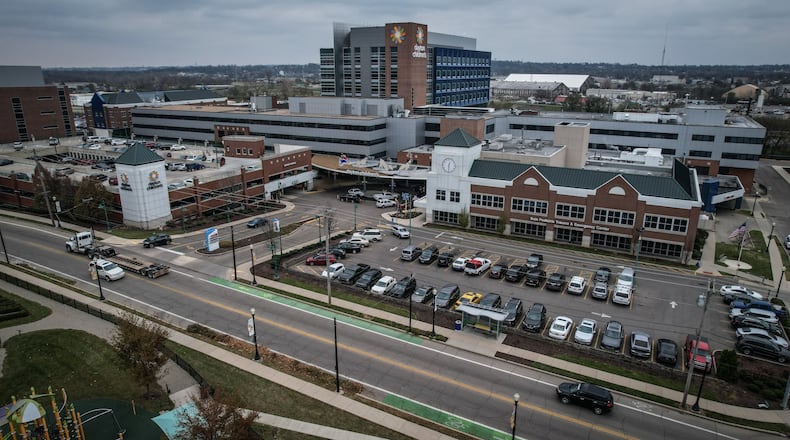Dayton Children’s doctors say mental and behavioral health disorders in children were growing concerns even before the pandemic, but the COVID-19 pandemic was like putting gasoline on a fire when it came to rising disorders.
“The rates of mental health disorders have really been climbing since the pandemic, and they continue to stay high even though now that we’re out of the pandemic,” said Dr. Kelly Blankenship, associate chief medical officer at Dayton Children’s. “I think people were hoping to see a decrease in mental health risks, in suicides, but we’re not seeing that.” Dayton Children’s reported a 20% increase of activity at its crisis center between July 2021 and June 2022.
The hospital’s new $100 million behavioral health building was announced in May and will double the available space for behavioral health patients by 2025. The building is receiving a $25 million allocation from the American Rescue Plan. The project also will continue to transform a hospital campus that has seen more than $375 million in new investment in the last decade.
The expansion of the crisis center will double Dayton Children’s assessment capacity, and the new space will allow for the co-location of crisis services with other behavioral health acute services, according to the PDAC submission.
Dayton Children’s crisis center will increase from seven to 12 beds, and the behavioral health unit will go from 24 to 48 beds. The crisis center operates like an emergency department for the behavioral health unit, but they only see mental and behavioral health issues in that center.
Behavioral health is the health care crisis of this generation, according to Dayton Children’s. A survey conducted during the pandemic revealed 17% of high school students and 19% of middle school students in Clark County reported they made plans to attempt suicide, Blankenship said. The data for Montgomery County was not available.
“We are still getting kids, very consistently, coming to our hospital with thoughts of wanting to kill themselves. That’s actually the number one reason that any child is admitted to Dayton Children’s Hospital is for having thoughts of wanting to kill themselves,” Blankenship said.
The hospital said in September that 900 children had been admitted to Dayton Children’s Hospital this year with depression or suicidal thoughts. For all of 2021, that number was 1,097 admissions. Blankenship told the Dayton Daily News previously that when kids leave their behavioral unit, one in seven return in about 30 days.
The budget for the crisis center expansion is $5.9 million, according to the PDAC submission. Approximately $1.9 million are hospital funds. Dayton Children’s has also already received a $2 million donation from CareSource, a Dayton-based insurance and managed care provider. The donation was also made in the honor of Jayda Grant, daughter of Anthony Grant, University of Dayton men’s basketball coach, and his wife, Christina. Jayda passed away in May 2022.
Kids are facing a number of stressors contributing to mental and behavioral health disorders, including social isolation, bullying, and maladaptive coping mechanisms. Social media isn’t helping, either, as Blankenship said it can contribute to isolation, promote those maladaptive coping mechanisms or suicidal thoughts as normal behavior, and also lead to more bullying.
“We know that the severe bullying over social media has increased throughout the pandemic,” Blankenship said.
Dayton Children’s offers parents and caregivers resources through its program, On Our Sleeves. Parents can sign up for free at the hospital’s website and receive kits and monthly newsletters to help parents connect with and talk to their children.
“Once kids start communicating, then they’re going to feel safer and better about talking about mental health issues, too,” Blankenship said. “It’s really huge for kids to be able to have that open communication with their parents.”
By the numbers:
According to Dayton Children’s:
- There has been a 163% increase in children hospitalized for mental health from 2020 to 2021 across the country.
- There was a 51% nationwide increase in emergency department visits for suicide attempts in adolescent girls from 2019-2021.
- Approximately 17% of high school students and 19% of middle school students in Clark County reported they made plans to attempt suicide, according to a survey done during the pandemic.
- Approximately 33% of high schoolers say they feel more unhappy or depressed than usual.
- Approximately 71% of parents report that the pandemic has taken a toll on their children’s mental health.
About the Author

